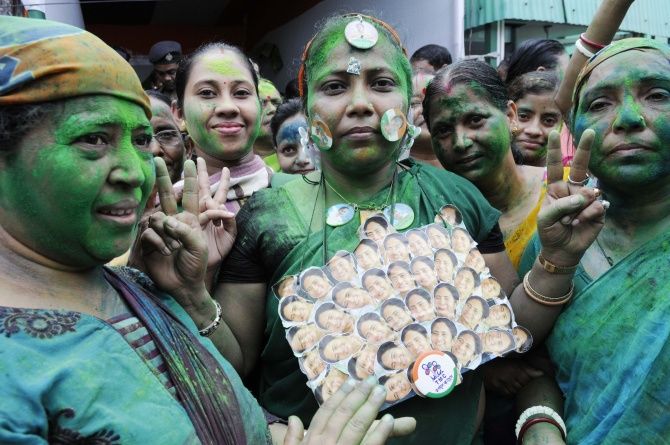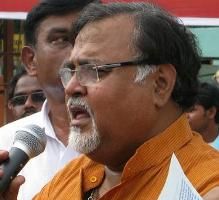
'West Bengal is an industry-friendly state.'
Despite the Saradha scam, the Narada sting video and the collapse of the under-construction Vivekananda flyover in Kolkata, the Trinamool Congress recorded an assembly election victory in West Bengal even more resounding than the one in 2011.
The new government will take oath on May 27.
In the first term of the government, Partha Chatterjee, below, left, saw many ups and downs, one among them being his losing the industry portfolio to Amit Mitra. Will the second term be different for Chatterjee?
In an interview with Namrata Acharya, Chatterjee, now Bengal's education and parliamentary affairs minister, talks about what worked for the party in this election and the road ahead for the state.
What do you attribute this assembly election mandate to?
The biggest reason why people voted us back to power is our commitment to developmental work and overall welfare of the state.
We have built roads, provided power and water, improved access to education and created jobs, to mention just a few of the developmental work we have done.
Some of our schemes such as Kanyasree Prakalpa and Yuvasree are unmatched.
People in the villages have seen our work and voted the TMC back to power.
Do you think there is any area where the government could have done better?
Whatever we have not done in the first term, we will do it in the second term, and more.
For example, in the health sector, we need more reforms.
Before the assembly elections, there was a time when people thought that issues such as the Narada sting video and the flyover collapse would impact the results. Will the party take any action against the leaders who appear in the video?
The entire issue was the creation of the media. It blew things out of proportion.
The Narada issue is now in court, it is sub judice. It will not be appropriate to comment on the issue.
However, it is up to the party to decide whether there will be an internal probe or not.
As an individual leader, I cannot comment on the matter.
In the second term, what will be the TMC's agenda on industrialisation?
If you see the numbers, the rate of growth of industrialisation in West Bengal is much higher than the national average.
We have created the necessary infrastructure for development of industry.
We have improved the work culture and we have been a fair government.
Now, the system of approval decisions for setting up industries is managed in a time-bound manner.
Also, the number of approvals and clearances required for setting up an industry in West Bengal is much less than what it used to be.
All this has helped West Bengal achieve a high growth rate in industrialisation.
In particular, it has helped small and medium industries.
 There has been an improvement in the development of small industries, but no large-scale industrialisation has taken place. What will be the government's agenda now?
There has been an improvement in the development of small industries, but no large-scale industrialisation has taken place. What will be the government's agenda now?
If you see the global trend, few investors are making major investments.
The primary growth comes from the manufacturing sector.
However, our government has been able to instil a sense of confidence among investors.
They can now see the advantages of coming to Bengal.
We have created a sound work culture and provided opportunities in terms of cheap labour, infrastructure creation and an overall thrust on industrialisation.
As far as big industries are concerned, we are looking at opportunities. We are a competitive state now.
Can we expect any change in the state's industrial policy?
We already have a good industrial policy, so we do not need any change in policy as such.
West Bengal is an industry-friendly state.
Will there be any change in the state's stand on Singur?
Our stand remains the same.
At present, the matter is sub judice.
Based on the Supreme Court's verdict, we will take a decision.
However, we are committed to returning the land to unwilling farmers.
The balance 600 acres could be used for industry.
The entire land is now with us. However, we are waiting for the Supreme Court's verdict.
Critics of the government say the TMC has been particularly opposed to special economic zones. This has kept companies such as Infosys away. Will you review the SEZ policy?
It is a policy matter and the decision will be taken at the cabinet level. We are opposed to acquiring land forcibly.
IMAGE: Trinamool Congress workers celebrate their party's victory in the assembly elections. Photograph: Abhiroop Dey Sarkar for Rediff.com











